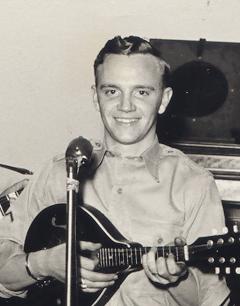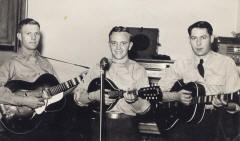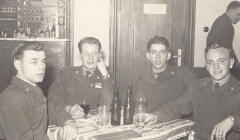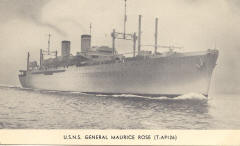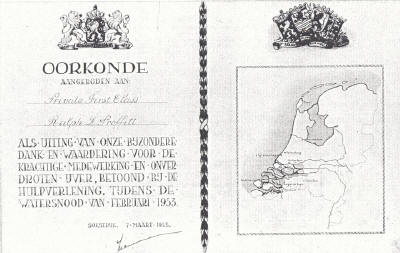|
We need your help to keep the KWE online. This website
runs on outdated technology. We need to migrate this website to a modern
platform, which also will be easier to navigate and maintain. If you value this resource and want to honor our veterans by keeping their stories online
in the future, please donate now.
For more information, click here.
|
|||||||||||||||
 |
|||||||||||||||
| Back to "Memoirs" Index page | |||||||||||||||
|
|
Ralph L. "Red" ProffittSullivan, IL- "It [the military] was certainly a learning experience for a young guy... something that I certainly wouldn’t want to do again, but I’m glad I did it because... you come home with an all together different perspective." - Ralph L. Proffitt
|
||||||||||||||
|
From an interview in May, 2002 by Charles Knox with Red Proffitt about his Korean War experiences. |
|||||||||||||||
The 44th National Guard Division was activated due to the Korean War. I was working in Sullivan at the time, and the majority of my friends were in the 44th Division and I was not. After they got activated I thought, well, I’m not going to stay here by myself, so I joined. I was quite young at the time, I was 17. I went with the Division to Camp Cook, California and due to the fact that I had taken typing in high school, they made me a Company Clerk. I typed all of the morning reports and all the documents that needed to be done at the company level, and then later, the decision was made to transfer the 44th Division to Fort Louis, Washington, but the personnel in it were not, by most accounts, going with it. They were going to Korea and other duty stations. So when all the people were being transferred out, because I could type, I was assigned to Division Headquarters to work in the Order Department. It was headed by a major whose name I don’t remember. I had worked there for a couple of months in the order section, and he came in one day and said "Red I have a decision for you to make." I said "what’s that?" He said "well you can go to Germany in this order manifest, or you can stay another 30 days and you can go to Korea next month." And I said "well that’s not a real big decision for me to make because in Korea they will kill you." So I had the distinction of cutting my own orders sending myself overseas. This was in 1952. So he gave me a 3 day pass, signed the orders, and I left that afternoon. Spent some time at home, went to Camp Kilmer, New Jersey, and shipped out for Germany on Thanksgiving Day aboard the USS Sterges. While going to Germany we had the unfortunate experience of hitting a violent Atlantic storm in which virtually everybody on the ship got seasick to the point that some of us were really hoping that the ship would just sink and get it over with. It was quite an experience for a 17 year old kid. When we pulled out of New York I was so homesick that I could hardly describe it. I could barely see the lights of New York above the water late in the evening. I was standing there with tears running down my face. This big old grizzly Master Sergeant walked up, he had hash marks from his elbow to his wrist which indicated his tours of duty, and he said to me, he said "soldier, you home sick?" I said "boy I sure am." Said I would jump off this boat and swim back if I could. He said "don’t worry about it." He said "I’ve been overseas five times", and he said "I cry every time I leave." I turned and looked at him and tears were running down his face as well as mine, so I thought well I really don’t have to be apologetic to him because this guy with all his experiences if it still has that much effect on him, then I needn’t apologize. We got in to Bremerhaven, Germany and went though the English Channel. They closed all the water tight doors because there were still mines from World War II floating in the Channel. We passed the White Cliffs of Dover, which was quite an experience since I had heard so much about them. But having the water tight doors closed and you are locked in your compartment was a little bit of a concern because you if happen to hit one of those mines that on occasion was found still floating, it was supposed to take out only one compartment and leave the ship still floating. But at any length, it made it a little bit unnerving to be locked up in that thing. This happened from the time we entered the English Channel until we got into Bremerhaven. In Bremerhaven I was sent to the Headquarters of the 39th Engineer Construction Group. The trip from Bremerhaven to Karsgrew, which is a major town outside of Belion, was an overnight deal. I was small at that time, I weighed 120 pounds when I graduated from high school and I probably weighed 125 at this point. They had us jammed in individual rooms on this train and there were 6 of us in this compartment room with all of our duffel bags and not room for anybody to move around. So they gave me the distinction of sleeping in the baggage rack which was nothing more than 3 metal supports coming out of a wall that had like a basketball netting, so that night was not very pleasant. I got to our destination and we were standing in formation and again my typing skills became important. As I was standing there with probably 30 or 40 other GI’s that had been assigned to this unit, Master Sergeant came walking down the sidewalk and said "is there a Proffit in the group." I said "that’s me", and he said "you’re supposed to come with me." So I went with him as instructed. We went over to the 39th Engineer Construction Group Headquarters, and he said "you’re going to be Training NCO for the 39th Engineer Construction Group." I said I had no idea what you’re talking about. And he said "well, we need a person to do inspection training for Colonial Niles, who is a bird Colonial in charge of these companies that are in this group". I was a private, 1st class at that time. I didn’t have a clue what I was doing, and he said "well, what we really need you to do is go out and type up reports on the training that is given every week at these different schools, and turn it in to Colonial Niles for his inspection." So that was a lot of responsibility for a guy that had no idea what he was doing. We got into it, and one of the things that I learned not too long after I was there, the relations between NATO and Russia were not good at all. So we had these semi-monthly alerts. That’s when the CQ would wake you up in the middle of the night and say "we’re on alert, we’re going here, and we’re going there." Your responsibility was to pack all of your gear in your duffel bag and report to your job position. Mine was in Group Headquarters, and all your files had to be marked "destroyed" or you had to show how the files that you were in charge of were handled. They’d load us all on 2 ½ ton trucks and take us out and drive us around the square and come back and let us out, and in the meantime your clothes were all wrinkled. You had to go through the process of going back to the PX to get them cleaned and pressed. I went through that about 3 or 4 times. I thought well, this is nuts. So in February of ’53 the CQ came into my room one morning about 2 o’clock. He said "Red, get up you’re going to Holland." And I though, uh-uh, I’ve heard this before, so I threw 2 pair of fatigues in my duffel bag and I went to Group Headquarters because they were not going to make me press all my clothes again and go through all this stuff, what I thought was just wasted time. I get to Group Headquarters, and strangely there is Colonial Niles, and I hadn’t seen him in any of these alerts, and it was quite unusual that he was there. As I walked in he said, "Red, are you ready." I said "Yes, sir." He said throw your duffel bag in the back of my staff car, we are going to Holland. You and, he named 3 or 4 more enlisted people, and 4 other officers who were going to Frankfort, are going to board a plane for Holland. Now I’m sitting there with only 2 pairs of fatigues in my duffel bag, and I would have given a quart of blood just to get back to the barracks for just a few minutes, but there was no way I could get away from him. I threw in these two pair of fatigues and climbed in the staff car, and was very, very uneasy. I knew if he found out about it I was in trouble. He was a West Point officer, and a West Point graduate, and he didn’t put up with any Mickey Mouse stuff. There was a right way to do it, and a wrong way to do it, and no in-between, and I was certainly in between at that point. So we go to Frankfort and got on this air plane, and we fly into Holland. There had been major dyke breaks along the coast of Holland, which is mostly below sea level. The North Sea had broken through and in fact there is some film out there that I’ve seen on television that touched on it. It’s called, I think, one of the Great Storms of the 20th Century. I was in the advance party with Colonial Niles. Colonial Niles had been appointed by General Ridgeway, who was over the European Theater, to head this salvage operation. We were to help the people of Holland to repair the dykes, get the water pumped back out and try to restore the area to sense of normalcy. Daybreak had come and we were flying into Braden, the pilot told us that there was some little town down there he indicated would be the size of Villa Grove or maybe smaller, and we couldn’t even see a chimney sticking out. It was completely covered and it was quite an astonishing sight to us. And it kind of gave Colonial Niles the sense of what a job he was going to have to set up the incoming companies from primarily in Germany. There were amphibious duck companies, all kinds of engineering equipment to come in. We had to fly in air strip matting in order to get to these dykes that hadn’t broken but needed to be supported., We thought, the day we got there, that the Holland government was prepared to feed us and they thought we were bringing our own food, so consequently, we went without food for 3 days. Three days doesn’t sound very long, but if you don’t have any food and you know you’re not going to get any for a while, it really gets tough. I knew that eventually I was going to get something to eat, but I wasn’t sure that I wouldn’t be standing in front of the firing squad if he found out that I was there with only two pairs of fatigues. I knew that mail call would be very important to the people over there. I knew that there would be a courier coming from Germany to bring mail. In the meantime the 5th hospital group had come in and set up a kitchen, and were of treating people that were hurt and injured and whatever needed to be done. I knew that the first place that the courier would go would be the kitchen. So I went over to the mess hall one day and I said, "I’m in real trouble, and I desperately need your help." And he said "what’s wrong?" And I told him my story. And I said, "if Colonial Niles ever finds out that I only have two pairs of fatigues when I was suppose of brought my whole duffel bag, my treatment is not going to be nice." So I said "would you please call me when this guy gets here." So the next day he called and he said the fellow you wanted to talk to is here. In the meantime I had gotten into my second pair of fatigues. I’ve only got one left, and Colonial Niles was very stickler on being properly dressed and having your uniform look proper. I went over there and I told this courier what my situation was, and he said "well I’ll be three days to get the bag here. By the time I get back and come back, it will be three days." I gave him the combination of my lock and he brought everything I had, and he called me when he got back. He had all of my clothing and everything so I got away with it. Colonial Niles was very diplomatic or he didn’t know it. And I truthfully don’t think he knew, because had he known I don’t think there would not have been any hesitation on his part, he would just have court martialed me. I’m sure of it. But we worked very closely together there, and he was promoted to Brigadier General from that operation. Some of the things that haven’t been shown in this history of these great storms is the effect it had on farm animals and animals of all kinds. They were just shoved up in huge mounds and burned, and it was just very, very hard to believe that that kind of thing could happen in that short period of time. But it took about three months, but we finally got it done. When we fixed the dykes, they used air drops, put plugs in the openings in the dykes, and finally got the flooding stopped. They reinforced the ones that hadn’t broken by using air strip matting to get up to them. Part of my job was also inspecting some of the dykes that had not broken and recommending what should be done with them. There again, I’m not a bit more trained in this than anybody else. I’m still a PFC, and I’m not an engineer, and I certainly don’t know anything about engineering. But anyhow that’s the job I had. After we finally got the thing back to where it was manageable, and returning the thing to the place where they could begin to get up off the ground and get back to reclaiming their lives, they gave us a pass to go into Braden. Three of us went in, and Braden is just a little ways from the camp we were working out of so we walked up town one evening. We were really looking for a place to get a beer, and saw a sign, looked like a bar. We walked in into a very, very nice restaurant, white table clothes, it was very nice. Of course, in the meantime we’ve all gone through all of our clothes, and we were now muddy and dirty, and so we turned to leave and the proprietor called to us and he came in the room. He could speak rigid English, and he said "did you all want to eat." We said "well, we were just looking for a place to get maybe a sandwich and a beer." We certainly weren’t dressed to be in a place like that. He told us to stop. The place was not a big place and all of the tables were full. He walked over to this table, these four people sitting there, and talked to them. They got up and gave us their table in the middle of their meal, which I thought sure showed the appreciation from them for what we were doing and had done. General Ridgeway flew in and had a meeting with Colonial Niles, and then we went back to Germany and spent the rest of my time there. Another thing I got to do. I had cleared post to come home. Harry Truman was our President at that time. I was waiting on my orders. I had already trained my replacement, and I got my orders all right, and my orders extended me for 90 days. So that was a little bit disheartening to me. Part of my responsibilities during those 90 days was guarding prisoners. And so there again, I was not trained to be a guard. So now I’m an MP and I’m and Engineer and I’m a chemical and biological warfare specialist. In the meantime, I’ve been promoted to Corporal. I finally did get promoted to Staff Sergeant. That happened very late in the game. But I had an interesting military carrier. And, you know, you couldn’t pay me enough money to get me to do it again. But you couldn’t take away my experience. It was great for a young guy. Something else that I did when I was in the military, and when I was younger I had a band, a Country-Western band. I established a band over there and played the enlisted men’s clubs. Of course at that time, right after the war was over, there’s not very much entertainment for the GI’s and there was an army base about every 10 miles. We started going to the enlisted men’s clubs and setting up engagements and playing. It gave us something to do and made a little money. They furnished the vehicles to transport our equipment. So we got to be pretty good. We just had a pick up group of guys who got together and started playing and they started asking us to come to the enlisted men’s club where we were stationed, and it just kind of mushroomed from there. Another thing that happened, they set up a competition for the best bands in Europe and the winner of this competition was to get a month’s vacation back to the states. So just as a lark we decided we would enter the thing. Their electricity over there was twice what ours is here. 220 volts direct current. You had to have a reduction box, for our electrical instruments to play, so we had one of our band members run the reduction boxes and one of them run the PA system. We went through the first level of competition. We won the first two. We only had to win one more. In the meantime two of the band members found out that they had both been going with the same German girl. They got into a big knock down, drag out fight. One of them had the reduction boxes and the other on the PA system. And they both quit. Just like that. I don’t know that we would have won it, but I sure would like to have had an opportunity to find out. But these two cut us off right at the knees.
I got back in to New York in October. One of the greatest sights that I’ve ever seen in my life, and I’ve lived a long time, was when the tugs came out to meet our ship. It was foggy in the early morning and you couldn’t see anything. Just as we were going by the Statute of Liberty, the fog cleared, the sun was shinning, and I’ve never seen a more beautiful sight in my life than the Statute of Liberty. Because I knew I was back in comfortable surroundings, and people that were my family and friends, it’s just a feeling that’s just very, very tough to describe. Particularly after being on a cruise ship with 4,000 people going over. They had us locked down below for three days for a storm, it’s not going to sound very good, but there were all kinds of things running in the halls of the ship and you had to have your combat boots on because it was ankle deep in some places. It was just absolutely a 13 day period that was hard to describe. I guarantee you right today, if I smell the galley on one of those ships, I would probably get ill. You had the smell the diesel fuel and everything else, and it was just terrible. The ship was so rough that I’d tied myself in my bunk for two nights so that I wouldn’t get thrown out. We had 4,000 of us on the ship, I’d been instructed to by the Merchant seaman said "make sure you get a top bunk" and I said "why would I want a top bunk." Because he said "that way if you get sick, your throwing up on them, their not throwing up on you." That was a good piece of advice. I’ll tell you one thing he didn’t tell me, that you travel a lot farther than side to side in the top bunk then you do the bottom. We were back on the back part of the ship and the swells that we were hitting, I’d have to estimate how high they were, and it certainly looked to me like they were 75 to 100 foot high. They made the ship just look like a cork. The ship would start riding the swells that came in going up the crest and then as they roll out from underneath it, the entire ship would fall and hit the water, and it’s like you shot a cannon off. And the third day they stretched a steel cable around the side of the ship, they had to get us out to get some fresh air because we had been down there so long. There were some of them in pretty bad shape. Some of them hadn’t eaten for a few days, and they knew they had to get us some air so they ran us out on deck in shifts. I remember the first time and now this is the time the storm has started to subside. I walked out and I saw that the ocean, and how angry it was, and you talk about making you feel insignificant. But it really did, we were hanging on to this steal cable. I just don’t know what was worse, being down below not knowing, or being out there looking at what we were facing. A couple of days after that we got up one morning and it was just absolutely beautiful, blue sky and the ocean looked like a mirror. We saw these divers going over the side of the ship. We asked them, "What are those divers doing?" "Well during that storm they developed a leak and they are going down to check the hull." That was encouraging. Glad I didn’t know that during the storm. But I’ll tell you something, it was certainly a learning experience for a young guy. And as I said, something that I certainly wouldn’t want to do again, but I’m glad I did it because it was, you come home with an all together a different perspective. That pretty well explains my military carrier. |
|||||||||||||||
|
|||||||||||||||
 |
|||||||||||||||


